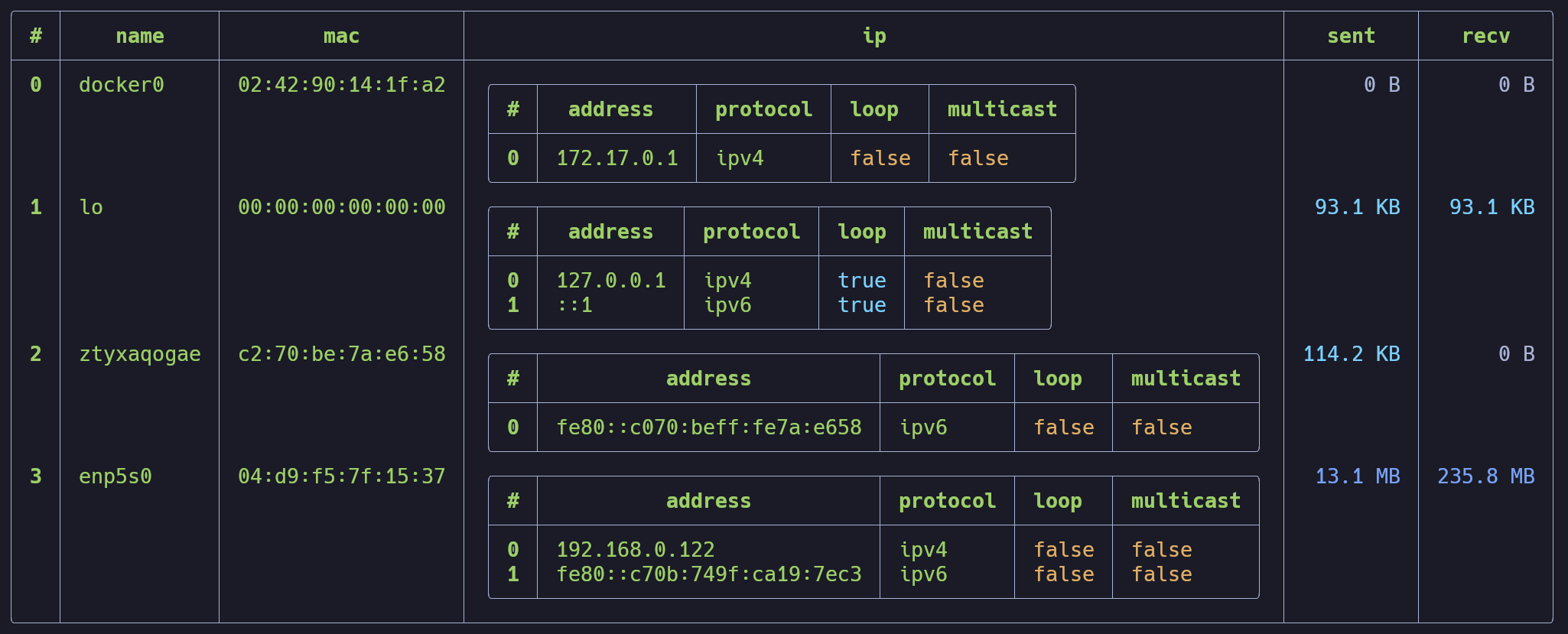mirror of
https://github.com/nushell/nushell.git
synced 2025-07-29 19:44:00 +02:00
<!-- if this PR closes one or more issues, you can automatically link the PR with them by using one of the [*linking keywords*](https://docs.github.com/en/issues/tracking-your-work-with-issues/linking-a-pull-request-to-an-issue#linking-a-pull-request-to-an-issue-using-a-keyword), e.g. - this PR should close #xxxx - fixes #xxxx you can also mention related issues, PRs or discussions! --> # Description <!-- Thank you for improving Nushell. Please, check our [contributing guide](../CONTRIBUTING.md) and talk to the core team before making major changes. Description of your pull request goes here. **Provide examples and/or screenshots** if your changes affect the user experience. --> What it says on the tin, this change adds the `mac` and `ip` columns to the `sys net` command, where `mac` is the interface mac address and `ip` is a record containing ipv4 and ipv6 addresses as well as whether or not the address is loopback and multicast. I thought it might be useful to have this information available in Nushell. This change basically just pulls extra information out of the underlying structs in the `sysinfo::Networks` struct. Here's a screenshot from my system:  # User-Facing Changes <!-- List of all changes that impact the user experience here. This helps us keep track of breaking changes. --> - Adds `mac` and `ip` columns to the `sys net` command, where `mac` contains the interface's mac address and `ip` contains information extracted from the `std::net::IpAddr` struct, including address, protocol, whether or not the address is loopback, and whether or not it's multicast # Tests + Formatting Didn't add any tests specifically, didn't seem like there were any relevant tests. Ran existing tests and formatting. <!-- Don't forget to add tests that cover your changes. Make sure you've run and fixed any issues with these commands: - `cargo fmt --all -- --check` to check standard code formatting (`cargo fmt --all` applies these changes) - `cargo clippy --workspace -- -D warnings -D clippy::unwrap_used` to check that you're using the standard code style - `cargo test --workspace` to check that all tests pass (on Windows make sure to [enable developer mode](https://learn.microsoft.com/en-us/windows/apps/get-started/developer-mode-features-and-debugging)) - `cargo run -- -c "use toolkit.nu; toolkit test stdlib"` to run the tests for the standard library > **Note** > from `nushell` you can also use the `toolkit` as follows > ```bash > use toolkit.nu # or use an `env_change` hook to activate it automatically > toolkit check pr > ``` -->
Nushell core libraries and plugins
These sub-crates form both the foundation for Nu and a set of plugins which extend Nu with additional functionality.
Foundational libraries are split into two kinds of crates:
- Core crates - those crates that work together to build the Nushell language engine
- Support crates - a set of crates that support the engine with additional features like JSON support, ANSI support, and more.
Plugins are likewise also split into two types:
- Core plugins - plugins that provide part of the default experience of Nu, including access to the system properties, processes, and web-connectivity features.
- Extra plugins - these plugins run a wide range of different capabilities like working with different file types, charting, viewing binary data, and more.